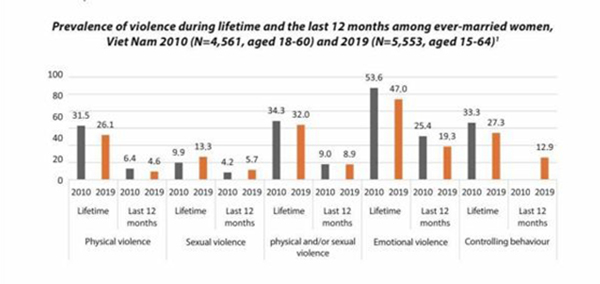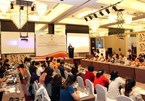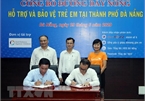 |
| SOURCE: UNFPA |
The Second National Study on Violence Against Women which was conducted last year and the results were released on Tuesday in Hanoi.
Vietnam is the only country in the world which has conducted a second dedicated study specifically using a cross-culturally validated methodology developed by the World Health Organisation.
The study was managed by the Ministry of Labour, Invalids and Social Affairs, in collaboration with the General Statistics Office, with technical and financial support from the United Nations Population Fund (UNFPA) and Australia’s Department of Foreign Affairs and Trade.
The study aims to enable a better understanding of what has changed since the first study in 2010, as well as what has not, and what needs to be in place for strengthening gender equality and ending gender-based violence in Vietnam.
Nearly 6,000 women aged 15 to 64 were interviewed, with results showing that in Vietnam most of the violence against women is perpetrated by their husbands or partners.
Under the study, prevalence rates of all forms of violence against women by their husbands are slightly lower in 2019 than in 2010, except for rates of sexual violence. For instance, fewer women experienced physical violence by their husbands in their lifetime in 2019 – 26.1 per cent compared to 2010 – 31.5 per cent. This was more prominent among younger women.
However, more women reported experience of sexual violence by their husbands in their lifetime in 2019, which is 13.3 per cent, compared to 2010, which is 9.9 per cent. This was more prominent among younger women aged 18-24, which is 13.9 per cent in 2019 compared to 5.3 per cent in 2010.
Women with disabilities were more likely to experience all forms of violence by a husband than women without disabilities.
Further, 4.4 per cent of women indicated they had experienced child sexual abuse before the age of 15.
Violence against women has serious consequences on economic development, as well as physical and mental health and is estimated to cost Vietnam’s national economy the equivalent of 1.8 per cent of GDP.
Nguyen Thi Ha, Deputy Minister of Labour, Invalids and Social Affairs and also Deputy Chairwoman of the National Committee for the Advancement of Women in Vietnam, said: "The percentage of women suffering from these forms of violence has decreased slightly. Positive change is clearly seen among young women who did not endure and showed their strength in fighting against violence."
Women who have higher education are less likely to experience violence. This shows that education is very important in helping women to be stronger, more confident and independent in life. However, many women are still vulnerable to violence. Violence against women remained hidden because gender stereotypes were still common in society.
“These shortcomings and challenges need to be thoroughly addressed by Government agencies as well as the socio-political organisations, non-governmental organisations and each citizen in society,” she said.
UNFPA Representative in Vietnam Naomi Kitahara said: “No matter where violence happens, in what forms, or who it affects, it must be stopped.”
“Together, we should work to create a world where both women and men, and girls and boys, can enjoy a life free from violence. We commend Vietnam for its commitment to achieving this vision,” she said.
Robyn Mudie, Australian Ambassador to Vietnam, said: “We have supported this study because it leads us all to acknowledge just how many lives are affected by violence, coercive control and harassment.
"Each piece of data in this report represents the experience of a Vietnamese woman or girl, whether in their home, at work or in a public place. This report means that we hear the survivors, we believe them, and we need to act,” she said. VNS

Vietnam praised for fighting violence against women, children
Vietnam has made great achievements in promoting gender equality and fighting violence against women and children, an official from the Korea International Cooperation Agency (KOICA) has said.

Da Nang launches hotline to protect children from sexual abuse
The Department of Information and Communications of central Da Nang city on June 29 commissioned a hotline to support the protection of children and adolescents from sexual abuse.
 Nearly two in three married women, or almost 63%, have experienced one or more forms of physical, sexual, emotional and economic violence and controlling behaviours by their husbands in their lifetime, a study has found." itemprop="description" />
Nearly two in three married women, or almost 63%, have experienced one or more forms of physical, sexual, emotional and economic violence and controlling behaviours by their husbands in their lifetime, a study has found." itemprop="description" />